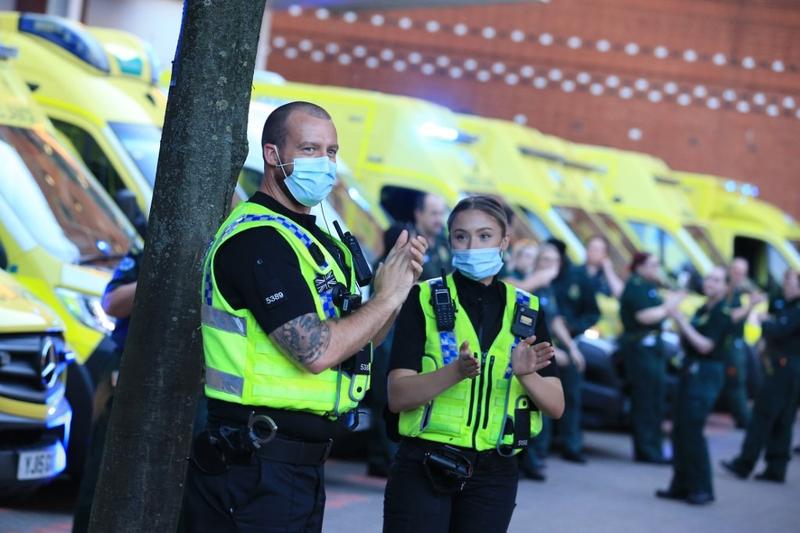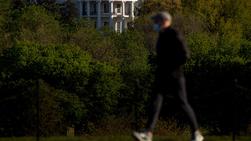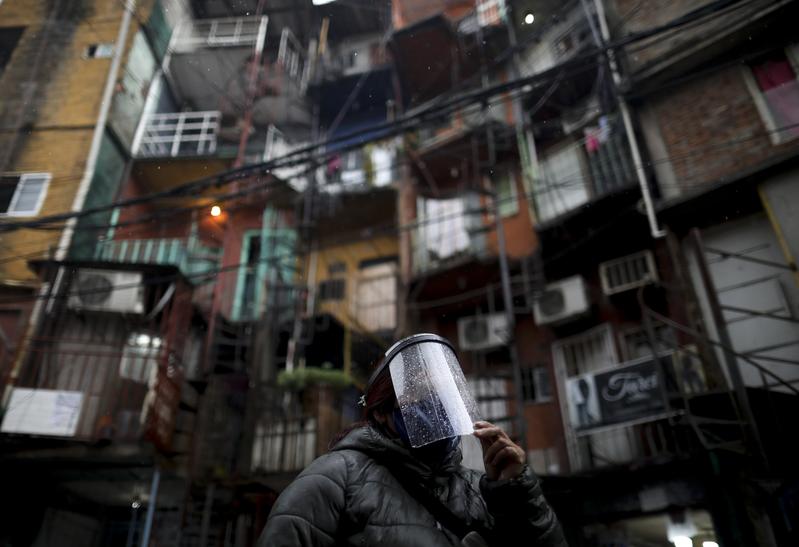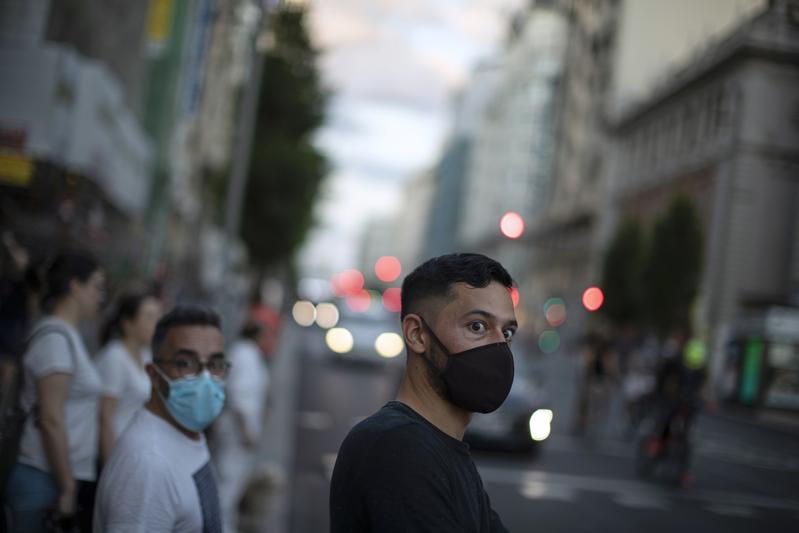 NHS staff members take part in a national "clap for carers" to show thanks for the work of Britain's National Health Service (NHS) workers and frontline medical staff around the country as they battle with the novel coronavirus pandemic, at Leeds General hospital in Leeds on May 7, 2020. (LINDSEY PARNABY / AFP)
NHS staff members take part in a national "clap for carers" to show thanks for the work of Britain's National Health Service (NHS) workers and frontline medical staff around the country as they battle with the novel coronavirus pandemic, at Leeds General hospital in Leeds on May 7, 2020. (LINDSEY PARNABY / AFP)
WASHINGTON / BERLIN / BUENOS AIRES / MEXICO CITY / ROME / MADRID / BARCELONA / LIMA / NEW YORK / RIO DE JANEIRO / MOSCOW / KAMPALA / KIGALI / CAPE TOWN / LONDON — Britain is to introduce a 14-day quarantine period for almost everyone arriving into the country to avoid a second peak of the coronavirus pandemic, The Times newspaper reported on Saturday.
It said Prime Minister Boris Johnson will say in an address to the nation on Sunday that passengers arriving at airports and ports, including Britons returning from abroad, will have to self-isolate for a fortnight.
According to the report, under measures that are likely to come into force in early June, travellers will have to provide the address at which they will self-isolate on arrival.
“These measures will help protect the British public and reduce the transmission of the virus as we move into the next phase of our response,” The Times quoted a government source as saying.
Britain’s COVID-19 death toll rose to 31,241 on Friday.
Downing Street declined to comment on the report and a spokeswoman for Britain’s interior ministry said: “We don’t comment on leaks.”
Johnson is due to announce on Sunday the next steps in Britain’s battle to tackle the novel coronavirus following a review by ministers of the current measures that have all but shut the economy and kept millions at home for over six weeks.
 The White House is visible as a man wearing a mask makes his way across the National Mall, April 22, 2020, in Washington. (ANDREW HARNIK / AP)
The White House is visible as a man wearing a mask makes his way across the National Mall, April 22, 2020, in Washington. (ANDREW HARNIK / AP)
US
US Vice President Mike Pence’s press secretary, the wife of one of President Donald Trump’s senior advisers, has tested positive for the coronavirus, raising alarm about the virus’ potential spread within the White House’s inner most circle.
Katie, she tested very good for a long period of time and then all of a sudden today she tested positive
Donald Trump, US President
The diagnosis of Katie Miller, who is married to White House immigration adviser and speech writer Stephen Miller, was revealed by Trump in a meeting with Republican lawmakers on Friday, a day after news that Trump’s personal valet had tested positive for the virus.
“Katie, she tested very good for a long period of time and then all of a sudden today she tested positive,” Trump said, noting he himself had not been in contact with her but that she had spent time with the vice president. “I understand Mike has been tested...and he tested negative.”
Also on Friday, a personal assistant of Trump's daughter Ivanka has also tested positive for the coronavirus, US media reported.
Citing an anonymous source, CNN reported that the assistant, who worked in personal capacity for Ivanka, has not been around the first daughter for weeks.
Ivanka and her husband Jared Kushner, both of whom are Trump's senior advisers, tested negative for the virus.
Despite Trump’s comments, the two cases in quick succession heightened fears of contagion for the president and vice president, who are leading the US response to the pandemic, and who have both resumed travel and business schedules even as the US death toll from the virus has topped 75,000.
White House Press Secretary Kayleigh McEnany on Friday sought to defend administration efforts to protect Trump and Pence, pointing to new measures taken by the White House including contact tracing and putting in place all guidelines recommended for essential workers.
West Wing staffers around Trump and Pence have not been wearing masks regularly.
The White House has also instituted daily, as opposed to weekly, coronavirus tests of Trump and Pence. Both men tested negative for the virus and were feeling well after the valet, a military service member who works as a White House assistant - came down with the virus.
Trump told Fox News he has not yet been tested for antibodies to the coronavirus but probably would be soon. Such a test could confirm previous exposure.
In New York, a 5-year-old boy has died from a rare inflammatory syndrome believed to be linked to the novel coronavirus, highlighting a potential new risk for children in the pandemic, Governor Andrew Cuomo said on Friday.
Cuomo told a daily briefing that the boy died in New York City on Thursday and that health officials were looking at other deaths involving children under similar circumstances to see if there is a link to COVID-19, the disease caused by the virus.
The syndrome shares symptoms with toxic shock and Kawasaki disease, which is associated with fever, skin rashes, swelling of glands, and in severe cases, inflammation of arteries of the heart. Scientists are still trying to determine whether the syndrome is linked with the new coronavirus because not all children with it have tested positive for the virus.
Cases of rare, life-threatening inflammatory illnesses in children associated with exposure to COVID-19 were first reported in Britain, Italy and Spain, but doctors in the United States are starting to report clusters of kids with the disorder, which can attack multiple organs, impair heart function and weaken heart arteries.
 A woman wearing a face shield walks through the Villa 31 neighborhood during a government-ordered lockdown to curb the spread of the COVID-19 coronavirus in Buenos Aires, Argentina, May 4, 2020. (NATACHA PISARENKO / AP)
A woman wearing a face shield walks through the Villa 31 neighborhood during a government-ordered lockdown to curb the spread of the COVID-19 coronavirus in Buenos Aires, Argentina, May 4, 2020. (NATACHA PISARENKO / AP)
Argentina
Argentina extended until May 24 a quarantine for its capital Buenos Aires but relaxed the restriction aimed at slowing the spread of the new coronavirus elsewhere in the country, President Alberto Fernandez said on Friday.
Argentina has been under national quarantine for seven weeks and the government has extended it three times previously
The lockdown, which was due to expire on Sunday, will remain in place in the capital and its outskirts, Fernandez said in a televised address.
Fernandez said he was “extremely proud” of Argentines for observing the strict social isolation measures, which he said had helped the government achieve its aim of flattening the curve of cases and deaths.
Argentines have been sealed in their homes since the quarantine was first announced on March 20 but since last month have been allowed to take short walks outside their homes during the day.
Buenos Aires Mayor Horacio Rodríguez Larreta told the same news conference that children would now be allowed to go out for exercise accompanied by their parents at weekends.
Argentina has been under national quarantine for seven weeks and the government has extended it three times previously.
As of Friday, the country had registered 5,611 confirmed cases of the virus and 293 deaths.
READ MORE: Virus threatens livelihoods, gaucho traditions in Argentina
Mexico
Mexican President Andres Manuel Lopez Obrador said on Friday he aims to present plans next week to reopen the economy, as key sectors like carmaking look to begin business again after over a month of quarantine measures to curb the coronavirus outbreak.
The government has been under pressure at home and abroad to set out plans for a return to normal as it battles the pandemic that has killed nearly 3,000 people in Mexico.
Mexico on Thursday reported 1,982 new confirmed cases of the novel coronavirus and a record 257 fatalities, bringing the total to 29,616 cases and 2,961 deaths. The government says the true number of infected people is significantly higher, however.
The number of deaths from the coronavirus in Mexico’s best-known border city, Tijuana, has soared and the COVID-19 mortality rate is twice the national average, the health ministry says, after medical staff quickly fell ill as the outbreak rampaged through hospital wards.
The virus has deepened the mild recession that Mexico entered last year, and analysts are now forecasting the economy could shrink by up to around 10 percent this year.
Peru
Peru has extended a nationwide lockdown by two weeks until May 24, President Martin Vizcarra said on Friday, the fourth extension of the isolation period amid a sharp rise in cases of COVID-19 in the South American country.
Peru’s confirmed coronavirus cases total 58,526 according to the latest official data from Thursday, while deaths have reached 1,627.
Brazil
Brazil registered 10,222 new confirmed cases of the novel coronavirus on Friday and 751 deaths, the health ministry said.
Daily deaths beat the previous record of 615 on Wednesday. Overall, Brazil has registered 145,328 confirmed cases of the new coronavirus and 9,897 deaths.
 People wearing face masks to combat the spread of coronavirus walk at Gran Via avenue in Madrid, Spain, May 8, 2020. Spanish health authorities will be deciding between Friday and Saturday which provinces show enough progress in their fight against the coronavirus to further ease lockdown measures starting Monday. (MANU FERNANDEZ / AP)
People wearing face masks to combat the spread of coronavirus walk at Gran Via avenue in Madrid, Spain, May 8, 2020. Spanish health authorities will be deciding between Friday and Saturday which provinces show enough progress in their fight against the coronavirus to further ease lockdown measures starting Monday. (MANU FERNANDEZ / AP)
Spain
Spain’s daily death toll from the coronavirus fell to 179 on Saturday, down from 229 on the previous day, the health ministry reported.
Overall deaths rose to 26,478 from 26,299 on Friday and the number of diagnosed cases rose to 223,578 from 222,857 the day before, the ministry said.
Madrid and Barcelona will not progress to the next phase of Spain’s exit from one of Europe’s strictest lockdowns that will allow bars, restaurants and places of worship to reopen in some areas from Monday, the government announced.
The country’s two biggest cities do not currently meet the government’s criteria for easing measures, Health Emergency Chief Fernando Simon told a news conference on Friday.
Spain has been one of the worst-hit countries globally and is just emerging from a strict lockdown, now in its eighth week, which kept people indoors, battered the economy and led to hundreds of thousands of job losses.
The government aims for a return to normality by the end of June.
It loosened the lockdown this week, with people allowed to take exercise and small businesses like hairdressers reopening with social distancing restrictions.
ALSO READ: Spain reports new jump in infections as lockdown eases
Germany
The number of confirmed coronavirus cases in Germany increased by 1,251 to 168,551, data from the Robert Koch Institute (RKI) for infectious diseases showed on Saturday.
The reported death toll rose by 147 to 7,369, the tally showed.
Italy
Italy on Friday became the third country in the world to record 30,000 deaths from the coronavirus, reporting 243 new fatalities compared with a daily tally of 274 the day before.
Italy’s total death toll from COVID-19 since its outbreak came to light on Feb 21 now stands at 30,201, the Civil Protection Agency said. Only the United States and Britain have seen more deaths from the virus.
The daily number of new infections fell slightly to 1,327 from 1,401 on Thursday, taking the total of confirmed cases since the epidemic began to 217,185, the third highest global tally behind those of the United States and Spain.
People registered as currently carrying the illness in Italy fell to 87,961 from 89,624 the day before.
There were 1,168 people in intensive care on Friday against 1,311 on Thursday, maintaining a long-running decline. Of those originally infected, 99,023 were declared recovered against 96,276 a day earlier.
The agency said 1.609 million people had been tested for the virus against 1.564 million the day before, out of a population of around 60 million.
READ MORE: Europe marks 75th anniversary of VE Day
Russia
Russia marks 75 years since the Soviet victory over Nazi Germany in World War Two on Saturday, but the coronavirus outbreak has forced it to scale back celebrations seen as boosting support for the Kremlin.
With coronavirus infections rising, President Vladimir Putin last month postponed the highlight of Victory Day celebrations, a massive parade on Red Square that showcases Moscow’s most sophisticated military hardware, to an unspecified date.
Russian authorities said on Saturday they had recorded 10,817 new cases of the coronavirus in the last day, pushing the nationwide tally to 198,676.
Russia’s coronavirus taskforce said that 104 people had died overnight, bringing the national death toll to 1,827.
Russian coronavirus cases overtook French and German infections this week to become the fifth-highest in the world.
Nearly 90 cases of the novel coronavirus have been recorded among employees of Polyus Krasnoyarsk, a unit of Russia’s largest gold producer Polyus, the regional branch of Russia’s consumer health watchdog said on Saturday.
Of the 89 infected employees at Polyus Krasnoyarsk, which is based in eastern Siberia, 82 tested positive for the virus in the last day, the regional branch of the Rospotrebnadzor consumer health watchdog said.
It said the employees infected with the virus were in self-isolation and that more were being tested.
Uganda
Uganda has registered 13 new cases of COVID-19, bringing the total number of infections to 114 in the east African country, the health ministry said here on Saturday.
The ministry said out of the 2,421 samples taken from cross border truck drivers on Friday, 13 were positive for the virus.
The 13 cases include seven Kenyans, four Ugandans and two Tanzanians.
"Tracking them has commenced and the public will be informed accordingly," the ministry said.
All the 740 community samples tested negative for COVID-19, according to the ministry.
Out of the 114 COVID-19 cases in Uganda, 55 have recovered.
South Africa
South Africa on Friday reported 663 new cases of COVID-19 in the past 24 hours, the highest number since March 5 when the country reported its first case, raising the total number of cases in the country to 8,895.
Meanwhile, 17 more COVID-19 related deaths were reported, bringing the death toll to 178, Health Minister Zweli Mkhize said in his daily update.
Rwanda
Rwandan Health Minister Daniel Ngamije on Friday said the health ministry plans to employ robots in coronavirus treatment centers and other public places.
The five imported robots that have been given Rwandan names will serve as an interface between the doctor and the patient, thereby reducing human contacts and risks of the virus's transmission, the minister said in a news program of national Radio Rwanda.
Besides being applied in the treatment centers, the robots will also be used to measure temperatures in other public places such as bus stops and entrances of shopping arcades, he said.


